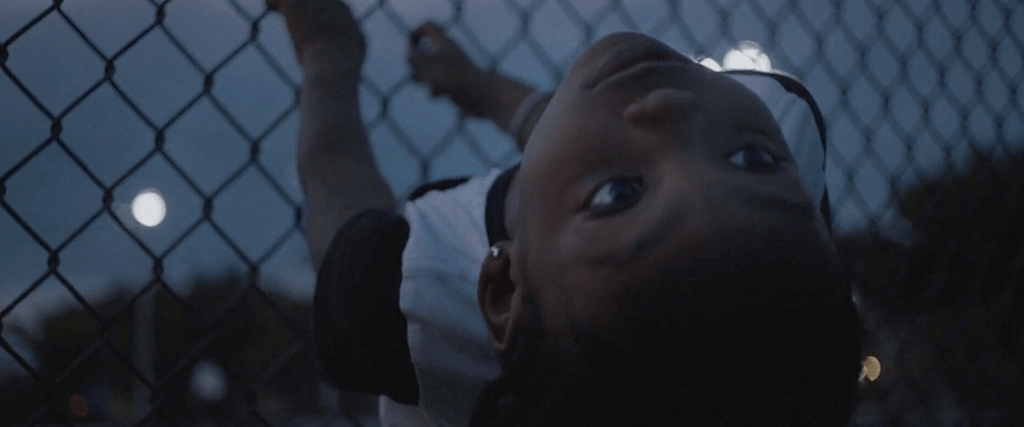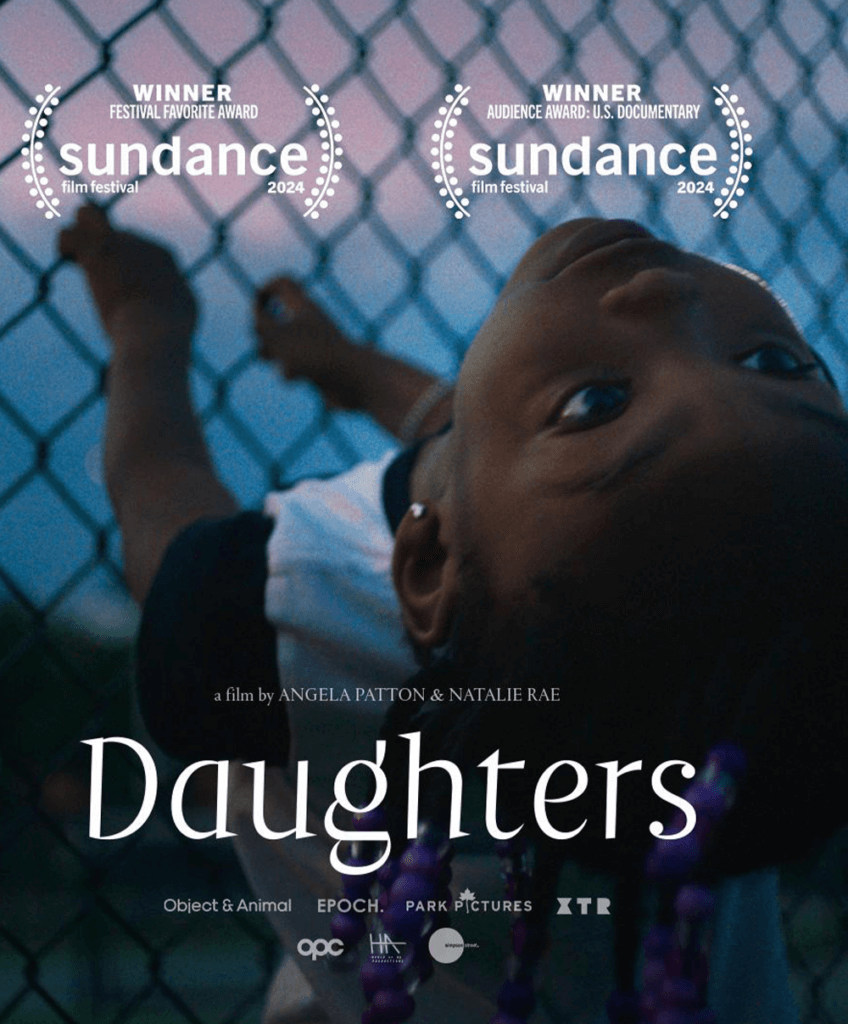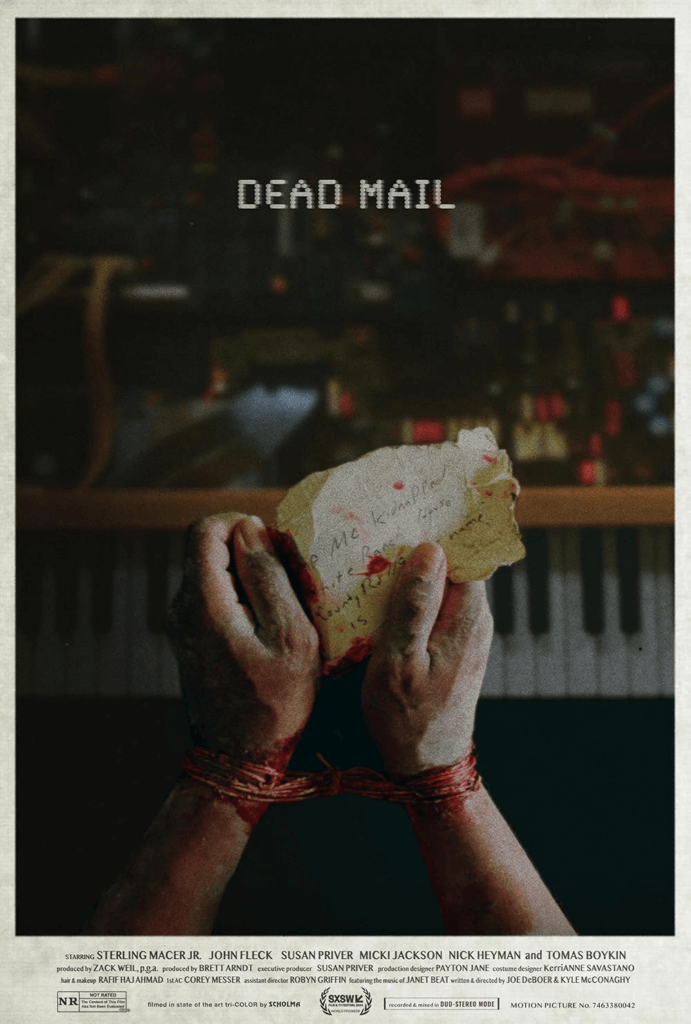
MSPIFF 2024 – Dispatch 2
By Brian Eggert | April 17, 2024
These films were screened at the 43rd Minneapolis St. Paul International Film Festival (MSPIFF43), which runs from April 11-25. Check here for the full lineup and check back for additional dispatches. Select films reviewed below will receive separate full-length writeups, some for their wider release, some exclusive to Deep Focus Review’s Patreon. In the meantime, here are some first impressions.
 Daughters
Daughters
Daughters, Angela Patton and Natalie Rae’s deeply moving documentary about the “Date with Dad” prison program, explores the vital connection between fathers and their daughters. CEO of the nonprofit Girls for a Change, Patton spearheaded the program, which gives men convicted of a crime a rare opportunity to bond with their daughters. The film informs us that most prisons have stopped allowing “touch visits” for incarcerated persons, preferring instead to monetize visits in a shamefully exploitative practice of charging families for video calls. What Patton’s program does is allow fathers and daughters to meet and reinforce their bonds through touch, a proven component of growth and development for children.
The focus of Daughters is four girls among a group of many who feel a spectrum of emotions about their fathers, including separation anxiety, frustration, and a desperate yearning to have their fathers back in their lives. The doc isn’t concerned about what the fathers did, just the unquestionable need for a father-daughter bond. Building up to the daddy-daughter dance (a preferable term over the awkward “Date with Dad” label), the film follows the fathers’ 10-week training course, where they talk in a group setting about their feelings toward fatherhood and consider how best to support their daughters emotionally and from a distance. At the same time, the doc showcases the girls’ anticipation about the upcoming event. Meanwhile, the fathers turn in their state-issued orange garb for suits and ties, and the daughters pick out dresses. The six-hour event takes place in a prison gymnasium with decorations, tables, music, and activities. Seeing these connections occur, some for the first time ever, is a tender experience. I challenge you not to crumble into a weepy mess.
Directors Patton and Rae began developing their film after the former’s TEDXWomen Talk on the subject in 2012, and it became a first-time feature for both, shot over eight years. Rae, who received her start in music videos for Serena Ryder, Tegan and Sara, and Leon Bridges, brings a lyrical style to the filmmaking. Some harmonious, polished images and impressionistic editing look conspicuously beautiful, as though arranged for a commercial rather than a grounded documentary. But no rule says a documentary can’t look polished. Refreshingly, Daughters never feels like an activist piece; instead, it communicates its message through observation, respecting the viewer enough not to resort to shouting its message on a soapbox.
Daughters premiered at the 2024 Sundance Film Festival, where it earned the Festival Favorite in the Documentary Competition and Audience Choice awards. Doubtless, the film, which has secured big-name producers in Kerry Washington and Joel Edgerton, will resonate with viewers when it arrives on Netflix later this year. The experience is an aching and empathetic look at how Patton’s program gives humanity to incarcerated persons, reminding these men that their families need them. A statistic at the end tells us that 95% of those who went through the program and have since been released haven’t returned to prison; they now recognize the importance of being there for their family. Similar to Sing Sing, another MSPIFF feature about drama therapy in prisons, Daughters demonstrates how such programs equip those incarcerated with the emotional intelligence to avoid criminal behavior in the future and become productive members of their community. But it also shows that, despite their imprisonment, these men have people who love and need them. 3.5/4 Stars.
 Dead Mail
Dead Mail
Hooking the viewer with its setup from the start, Dead Mail opens with a kidnapping victim, Josh (Sterling Macer Jr.), escaping from the rural Midwest home where he’s been trapped. His arms and legs bound with wire and chains, Josh crawls to a postal box nearby and stuffs a bloody note inside before his captor, Trent (John Fleck), races out in a failed attempt to stop him. Trying to cover his tracks, Trent hopes to track down the letter. But a savvy postal worker specializing in finding the intended recipients of misplaced letters threatens to expose Trent’s crime.
Dead Mail is the latest from Joe DeBoer and Kyle McConaghy, the writer-director team behind BAB (2020), and another in a long line of contemporary films that pay homage to the video aesthetic of the 1980s. With the filmmaking steeped in McConaghy’s grainy cinematography and intentionally bad angles and editing, one could mistake the production for a direct-to-video product on VHS. Synth beeps and boops flicker on Janet Beat’s soundtrack, which is less like one of John Carpenter’s slick scores than a knock-off synth sound with occasionally disorienting overtones. But at least the movie has a form-follows-function approach, since Josh and Trent, as we learn in an extended flashback, are preoccupied with building a synthesizer board that delivers a convincing woodwind sound. Their partnership goes sour, obviously, hence the kidnapping.
The nostalgic proceedings might be more charming if Dead Mail didn’t overstay its welcome. At 107 minutes, it feels about 20 minutes too long, mainly because that flashback section occupies most of the feature and, with the story structure, we know where things will end up. Robbed of its suspense given how it’s arranged, the mildly amusing and diverting movie earned a few chuckles at my late-night screening. While the presentation adopts a throwback look and feel, with irony that keeps the viewer at a remove, the skilled cast elevates the experience. Fleck is particularly menacing and maniacal, whereas Tomas Boykin has presence to spare as the post office’s resident mail detective.
DeBoer and McConaghy follow a long line of modern independent genre filmmakers who resort to an ‘80s analog aesthetic, synth music, and Lynchian vibes to entice their audience. It’s an overdone routine employed by filmmakers such as Panos Cosmatos (Mandy, 2018), Jennifer Reeder (Perpetrator, 2023), and everyone involved in the V/H/S anthology series who values pastiche over originality. In the case of Dead Mail, its imitative, weird-for-weird’s-sake style and narrative feel hollow, unsupported by a thin script and dragged-out pacing. To be sure, the experience loses steam early on and never quite restored this viewer’s interest. 2/4 Stars.
 In Flames
In Flames
In Flames occupies the subjectivity of Mariam (Ramesha Nawal), a young woman who lives in Karachi with her widowed mother, Fariha (Bakhtawar Mazhar), and her younger brother (Jibran Khan). After the recent death of Fariha’s father-in-law, who financially supported the family, the women struggle to make ends meet in a patriarchal world that constantly attempts to exploit and intimidate them. This includes Mariam’s Uncle Nasir (Adnan Shah Tipu), who initially offers to help out financially before he stakes a claim on their apartment—apparently allowable by law. But Fariha and Mariam know that to be in debt to a man is a dangerous proposition, and they value what little autonomy they have.
Confronting the gender roles and diminished power of women in Pakistan, writer-director Zarrar Kahn’s debut feature conveys an oppressive world for Mariam and Fariha without resorting to unabashed remarks about extreme religious fundamentalism and its consequences on gender. The film doesn’t have to preach to the audience; Mariam’s experiences reveal enough. Take the moment when Mariam is attacked while driving—some random man throws a brick through her car window and calls her a “whore.” Later, while looking out her apartment window, she notices a man in the alley watching her and masturbating. Nothing will be done to these men, thus conveying how Karachi is unsafe for women, a fact of which Mariam is repeatedly reminded. It’s the specter that haunts her throughout the film.
But then, Mariam is haunted by other, more literal ghosts as well. One of the men in Mariam’s life, Asad (Omar Javaid), courts her; however, her studies keep her too busy for new friends. Still, after agreeing to spend the day with Asad at a beach, she narrowly survives an accident that leaves her bloodied from a head wound. Afterward, she’s plagued by hallucinations that transport her back to the beach; she also witnesses nightmarish imagery in the form of chilling figures. Whether her ghosts are real or stem from her injury remains debatable, but either way, they confront how she feels tormented by men.
Pakistan’s submission for Best International Feature to the 96th Academy Awards, In Flames is capably directed by Khan and shot by cinematographer Aigul Nurbulatova, lending a naturalism sharply upended by the sudden presence of white-eyed phantoms. The film has a visual treatment in common with Mati Diop’s Atlantics (2019) in its use of malignant spirits, if not also Alex Garland’s Men (2022) for how the presence of any man becomes a warning sign to the viewer. The blend of horror and social commentary feels tipped toward the latter, underserving the former. Still, it’s nonetheless a powerful examination of women in Pakistan, a critique of its patriarchy, and an immersive look through the eyes of its characters. 3/4 Stars.
Unlock More from Deep Focus Review
To keep Deep Focus Review independent, I rely on the generous support of readers like you. By joining our Patreon community or making a one-time donation, you’ll help cover site maintenance and research materials so I can focus on creating more movie reviews and critical analysis. Patrons receive early access to reviews and essays, plus a closer connection to a community of fellow film lovers. If you value my work, please consider supporting DFR on Patreon or show your support in other ways.
Thank you for your readership!
Brian Eggert | Critic, Founder
Deep Focus Review




